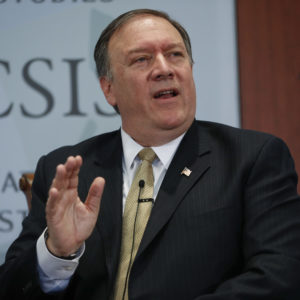JEJU, South Korea — Top U.S. officials are at odds on the critical question of whether to ask the North Koreans to set a timeline on when they will begin the step-by-step process of attaining “complete denuclearization” as promised in the Singapore summit between President Trump and Kim Jong-un and in two summits in Panmunjom between South Korean president President Moon Jae-in and Kim.
The differences put Defense Secretary Jim Mattis in apparent disagreement with Secretary of State Mike Pompeo, who said clearly he is not in favor of attempting to hold Kim to a timetable that would only obstruct progress toward reconciliation between North and South Korea as well as between North Korea and the United States.
Mattis, on a swing through northeast Asia that has taken him first to China and then on to Korea and Japan, did not specifically say that he wanted to pin Kim to a commitment on when he would show signs of getting rid of his nuclear and missile program, including warheads and the facilities needed to make them.
Rather, an anonymous source accompanying Mattis on his current visit to the region, said flatly that everyone would soon know “if they’re going to operate in good faith or not.” The source, speaking on behalf of Mattis, said the United States would be asking specific questions, making demands, calling for “a specific timeline.” The United States, presumably President Trump, would then “present the North Koreans with our concept of what implementation of the summit agreement looks like.”
Veteran American diplomats said this approach sounded much too threatening — and was sure to get nowhere — and could even result in a setback in efforts to persuade Kim to live up to the spirit of the Singapore summit.
It was to try to dispel these fears that Pompeo in Washington said bluntly he was “not going to put a timeline” on when the North Koreans should take certain measures needed to build confidence in Kim’s good faith.
Rather, Pompeo said in an interview with CNN, no matter whether the North Koreans act in two months or six months, “We are committed to moving forward in an expeditious moment to see if we can achieve what both leaders set out to do” at their summit on June 12 in Singapore.
Pompeo, however, may have unpublicized doubts as to the likelihood of North Korea acting in good faith. In order to determine how Kim really feels, he’s reportedly thinking of returning to North Korea for a third time. His return would be the first since he went there in May, had a long conversation with Kim and returned to the United States with three U.S. citizens who had been held there for unspecified crimes, probably spreading Christian prayers.
Unlike more hawkish members of Trump’s administration, notably the national security adviser John Bolton, Pompeo believes in the concept of “an ongoing process of making progress,” as he put it in a conversation with CNN.
Although his approach might be different from that of Mattis, they do share the common goal of seeking “complete, verifiable, irreversible denuclearization.”
Pompeo has said that he believes in the goal of “major disarmament” of North Korea, including a reduction of its armed forces of 1.2 million troops, during Trump’s first term in office. That’s an extremely vague goal — one that Mattis might not appreciate but does suggest a more realistic view.
Mattis, arriving in Seoul on Thursday after critical talks in Beijing, will undoubtedly be talking to President Moon and Defense Minister Song Young-moo about ways to deal with North Korea.
Mattis also will be talking about Trump’s decision to call off joint military exercises with the South Koreans. Trump did not discuss it with him before agreeing, at the Singapore summit, to acquiesce to Kim’s call for an end to war games in exchange for cessation of North Korean missile-and-nuclear testing.
Experts at the annual Jeju Forum for Peace and Prosperity expressed shock over Trump’s hasty agreement to Kim’s basic demand.
Gary Samore, executive director for research at the Belfer Center of the Harvard Kennedy School, said “the next obvious step would be to freeze the size of the fissile material” that North Korea has built up in recent years, but he doubted if Kim would agree.
“Such a process is going to be stretched out over years,” he said. “It’s very unlikely North Korea is going to stop its nuclear program.” As for the military exercises, he said Trump “could have agreed to trim the war games” by calling off flights of heavy bombers or deploying aircraft carriers off the coast rather than simply suspending exercises.
Joseph Yun, former U.S. negotiator with the North Koreans, was also disheartened by cancellation of this year’s war games, notably Ulchi Freedom Guardian, an exercise that’s been conducted every year in August.
Cancellation of the exercises “has implications for the strength of the U.S.-ROK alliance,” Yun said at the forum. “If the military do not exercise,” he said, “then why are they here?”

